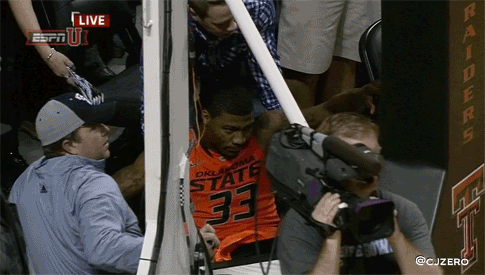Broken Feeder: Down with the College Sports-Industrial Complex
Grantland's Andrew Sharp turns a sober and measured eye to the case of Marcus Smart, a college basketball player who turned down the NBA draft to return to school, has struggled this year, and, in a moment of frustration, shoved a heckling fan this past weekend.

The thing that still bugs me is the bigger picture. Marcus Smart isn’t just any star, he’s the guy who turned down a place in the top three of the NBA draft and came back to school, the pride of college basketball. He was the guy who told the NBA it could wait, and college hoops loved him for it.
[…]
It’s a familiar pattern for guys who turn down the NBA draft. … Mitch McGary at Michigan … James Michael McAdoo at North Carolina.
I don't watch college basketball, or college sports at all. I don't have the personal connections to the institutions to care, and the quality of play is far too low. Using colleges as a feeder system for the professional leagues is broken: every year we get a bunch of one-and-done phenoms who were never in school to get an education, and a draft class of unprepared talent who aren't ready to play the pro game—and that's before we get into the corrupting influence of the money on the collegiate programs, or the moral quandary of a system that richly rewards coaches and athletic departments on the backs of unpaid labor (athletes) often from impoverished backgrounds.
I often compare the situation with US collegiate and pro sports to the junior clubsides approach of the English Premiere League. There, an aspiring player typically joins a youth team affiliated with an adult professional team and works his way up. The player is eligible to turn professional once secondary education is completed, at age 15 or 16. (This is particularly notable in light of the NBA's consideration of a minimum age limit of 20 for draftees.)
As much as we idolize sports in the US, we don't truly respect it as a vocation. We demand that our athletes pay lip service to academic pursuits that may mean nothing to them, and we hamper their development with restrictions like the NCAA's 20-/8-hour maximum rule on athletic activity . In contrast, a 15-year old international player may out in 40 hours or more each week in supervised training and practice activities. Who is likely to be the more polished, prepared professional player by age 19?
If we let our athletes truly go pro, right out of high school, we'd have a very few prospects that would immediately leap to the top ranks and a steady cohort who would enter the developmental leagues. This would be good for everybody: the young athletes would gain developmental time and exposure, earning incomes but without the sudden influx of riches that can cause problems with rookies; the professional leagues would draft more polished, better prepared players ready for the speed and physicality of the pro game; fans would no longer have to watch players take up to two years just figuring out the game while being paid significant salaries; and "major" college sports would return to being properly amateur, played by genuine student-athletes, and no longer sucking money away from smaller programs.
If we let our athletes truly go pro, the Marcus Smart situation never happens. Sharp comes close to recognizing the possibility in his piece:
…a big part of me just wishes Marcus Smart was on the Magic this year. Being treated like an object that idiots can scream at, or a talking point in a thousand different columns, or the centerpiece of debates on national television, or just a name for a scout to criticize – all of it is kind of dehumanizing and unfair, and it’s part of life for a superstar athlete at any level. It sucks for all of them. It just sucks a lot less for the guys who get paid millions to live with it.
The thing is, had Marcus Smart remained in the NBA draft and been selected by a team, this incident, or one similar to it, as well as the general nitpicking and deconstruction of a still very young player who opts to stay in school one year longer, would simply have happened to someone else.
Blow the whole system up, it's rotten to the core.